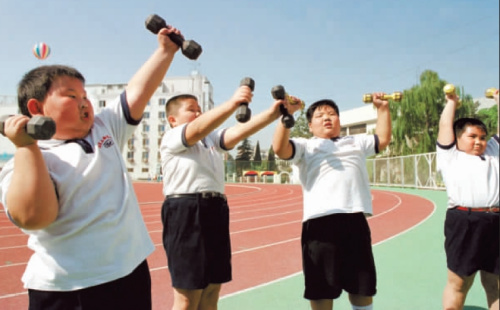
Obese children do exercise to reduce weight.(File photo/Beijing News)
Let's face it: Chinese people are getting wealthier, but not necessarily healthier.
Bian Ke, who has run a busy restaurant for 30 years in Chengdu, capital of southwest China's Sichuan Province, says the evolving tastes of patrons are responsible for the country's increasing waistbands.
"Up-market food, such as goose liver, is a symbol of high living and opulence," said the corpulent restauranteur. "However, they are not paying attention to the amount of protein they take in."
Traditional ingredients, such as chicken or duck, have now been replaced by lobster and imported steak -- the reason so many people are becoming "pot-bellied", he said.
China's breakneck economic growth has allowed people to enjoy fuller diets, but rich ingredients have led to an increase of obese Chinese. In Sichuan, the most populous province in southwest China, almost one third of the population is portly.
A 2013 survey found there were 62 million overweight Chinese, second only to the United States.
Unlike the West, it is not junk food such as fries and hamburgers that is to blame for the nation's bulk, but rather oil- and salt-heavy food such as hotpot and grilled meats.
"Nowadays, people are too busy to cook at home," Bian said, "which means they are not in control of the amount of oil and salt that goes into their food."
Han, a Beijing-based editor, said she prefers to eat out because "the taste is so much better [and] it is less time-consuming."
In Sichuan's Shuangliu County, Meng Ye's hotpot restaurant serves roughly 1,000 customers every day.
"Hot pot is not only delicious, but also cheap and convenient," Meng said.
A standard hotpot uses 2.5 kilograms of oil, Meng said, adding that salt and oil heighten the flavor."
Despite links to cardiovascular disease, high intake of salt and oil is a widespread problem in China. According to government figures, the daily intake of salt per person in south China is 10 to 12 grams, and that rises to 15 to 18 grams in the north. Even in Guangdong, which is known for its bland food, average salt intake is 9.1 grams per day, 82 percent higher than the recommended amount by the World Health Organization.
"Such improper dietary patterns are making the Chinese unhealthy. Something must be done," said Wang Yanping from China Medicinal Biotech Association.
Wang said a balanced diet and regular exercise were important, and suggested people eat more cereal and less meat.
Meanwhile, members of the People's Liberation Army have been reminded to stay fit or lose out on promotions, according to a guideline published in February.
"We may be getting wealthier," Wang said. "But more importantly, we should be getting healthier."
















































